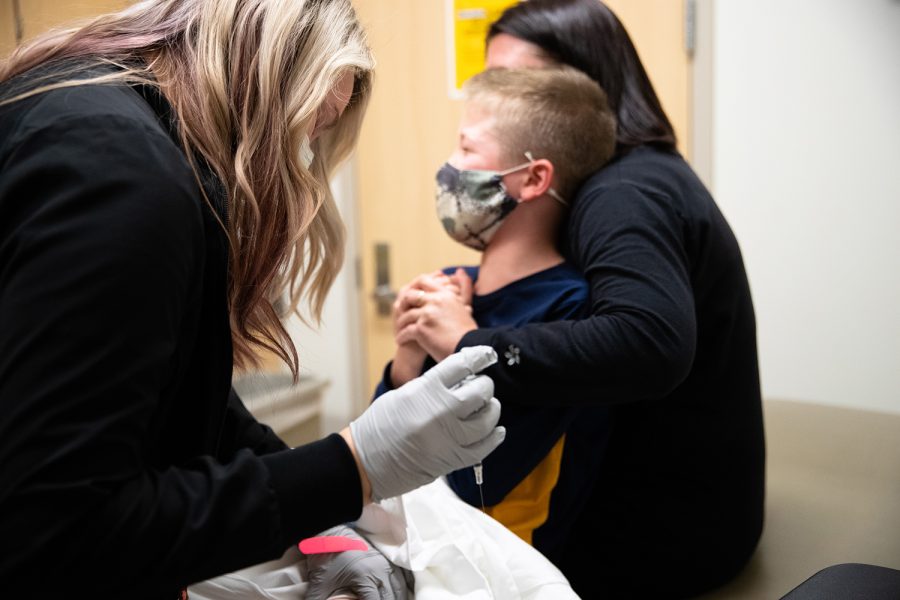COVID-19 vaccine update: Moderna FDA approved, access for kids under 5 postponed
Public health officials see a light at the end of the tunnel with the Moderna COVID-19 vaccine receiving full FDA approval and plans for kids under age 5 to receive access soon.
A University of Iowa Hospitals and Clinics staff member prepares to give a COVID-19 vaccine to Keegan Kleppe at the UIHC Riverside Landing Clinic in Coralville, Iowa, on Tuesday, Nov. 3, 2021.
February 20, 2022
Public health officials continue to recommend getting vaccinated against COVID-19 as shots becomes more available to the public and preparation continues to provide a vaccine for children younger than 5.
On Jan. 31, the Food and Drug Administration announced the full approval of the Moderna COVID-19 vaccine, which is now referred to as Spikevax. The Moderna vaccine is the second COVID-19 vaccine fully approved by the FDA — the first was the Pfizer-BioNTech vaccine in August 2021.
Sam Jarvis, the Johnson County community health division manager, said the full approval of the Moderna vaccine will benefit the community.
“With this being the second approved COVID-19 vaccine, again, we’re continuing to see positive information from our federal partners who monitor safety and efficacy,” Jarvis said. “We hope that the community continues to see this and recognizes the demonstrable safety and efficacy of COVID-19 vaccines.”
Pfizer submitted a request to the Food and Drug and Drug Administration to approve the vaccine in children under 5 on Feb. 1.
The FDA originally scheduled the Vaccines and Related Biological Products Advisory Committee meeting for Feb. 15, but postponed it until at least April on Feb. 11 to give the agency time to consider additional data, according to a release.
According to The Wall Street Journal, the two-dose series of the vaccine was not showing strong efficacy against the omicron variant of COVID-19 in young children, so both the FDA and Pfizer are awaiting additional data.
Jarvis said during a Johnson County Board of Supervisors meeting that Johnson County Public Health hasn’t received a timeline but is waiting for the information to be collected and analyzed before sharing it.
“As soon as we know more will continue to do so, like we have done with our pediatric partners and hospital and pharmacy partners, to plan for pediatric vaccine clinics,” Jarvis said. “Right now, we believe that most of these vaccinations will be preferred to be at doctors’ offices and other pediatric clinics settings, just given the nature of being much younger kiddos, but we’ll coordinate with our partners if there is a desire to do other pediatric clinics going forward.”
Mike Brownlee, University of Iowa Hospitals and Clinics chief pharmacy officer, said postponing the meeting will allow the FDA to consider data coming from an ongoing clinical trial that tests three doses of the Pfizer-BioNTech COVID-19 vaccine in children ages 6 months to 4 years.
“It was a good move to delay the meeting, so we won’t have to worry about altering the schedule of the dosing for children later,” Brownlee said. “Moving the meeting will allow time for the FDA and Pfizer to feel confident in the data they collect.”
Brownlee said results from the three-dose trial should come out in April. The dosage for the vaccine is also different — three micrograms of the vaccine compared to ten micrograms for children ages 5 to 12, he said.
“The FDA has to make sure there’s a good antibody response, and more doses can help show that,” Brownlee said. “Pfizer also wants to show that it prevents severe illness, hospitalization, and death.”
Extending the vaccine to young kids will help reduce the strain on hospitals, Jarvis said.
“Vaccination in this age group will have a dramatic impact on COVID hospitalizations,” Jarvis said. “The strategy now is to continue to go on with daily activities like school, which is why it’s important for teachers and day care workers to get vaccinated as soon as possible.”
Sarah Bengston, a physical therapist from Iowa City, said she vaccinated her child after it became available for hisage group in November.
“Although the technology is new, I feel confident in the vaccine,” Bengston said. “The adverse effects of the vaccine are rare, and the possibility of getting COVID-19 outweighs any worries I have about the vaccine.”
Since COVID-19 vaccines became available to the public over a year ago, Johnson County public health officials have encouraged the community to get vaccinated as soon as possible.
The best way to decrease the chance of severe infection and the rate of infection is through vaccination, said Christine Petersen, director of the UI Center for Emerging Infectious Diseases in the UI College of Public Health.
“They decrease the rate of infection that you’re going to have overall, creating a phenomenon called herd immunity — you have less people in a population who can spread the virus, making the amount of spread within the community less,” Petersen said.
Jarvis emphasized the importance of getting the booster shot as community transmission of the virus remains “high,” according to the Centers for Disease Control and Prevention, though cases have been falling since late January.
“It’s absolutely important that persons who have not been vaccinated do so and those who have, stay up to date with recommendations and receive their booster,” Jarvis said. “Even as cases decrease and hospitalizations due to COVID-19 decrease, now is not the time to let our guard down.”






